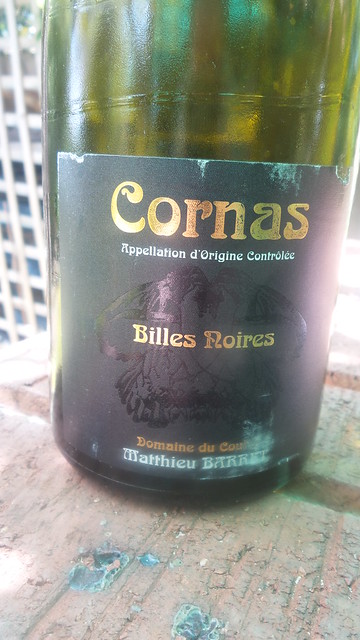A wine from my most recent WSET Level 2 class and one that I bought insanely cheaply at auction (yes, there are still auction bargains to be had). The bottle noticeably big and heavy. The label sparse but sophisticated. The whole thing screams class (bar the rather clumsy back label put there by the importer).
Cornas is a northern Rhône appellation so the wine is Shiraz based. In fact, it is solely Shiraz (no white grapes are permitted, unlike some of Cornas’s northern Rhône neighbours, such as Côte Rôtie or even Hermitage) and the appellation itself consists of just 90 ha.
When I lived in the UK and drinking wines from this part of the world was not such a luxury, people would quite routinely proffer the opinion that Cornas could represent far better value for money than some other appellations in this region. Of course, here in Australia our options are sadly limited and were you to walk into a bottle shop and be able to buy this wine, it would set you back around $200. Not my definition of “good value” …
As I bought this at auction, opening the bottle was even more fraught than usual and I held my breath, fingers crossed that the wine would be neither corked nor overtly bretty.
Thankfully it was neither. The wine received a resounding thumbs up in class and I loved it. My caveat here is that I am rather partial to this style of Shiraz so, as with any wine, especially one with age, your mileage may vary.
The wine
In the glass, very deep and still quite ruby in colour, so not showing its age quite as much as I expected.
The nose was quite pronounced, and the black pepper which you’d expect to see on a cool climate Shiraz is indeed there. There is also black fruit, licorice and anise. Everything looks promising.
On the palate, it delivers: the black pepper, blackberry and licorice are all there, accompanied by chocolate and cedar. There’s acidity and fine tannins with good length and altogether drinkable. It is, to use the most technical wine term available, yummy.
To the super sensitive there may be an argument that this wine showed a little teensy tiny bit of brett. Not in quantities to bother me.
I am just saddened that when I bought it there was just the one bottle for sale.
Matthieu Barret, purchased at auction.
Cork.
13.0% abv.

